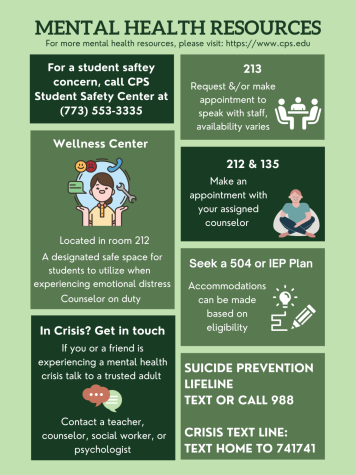Controversy behind modern day Feminism
December 17, 2014
Fem-i-nism. \fe-ma-ni-zam\. Noun.
The theory of political, economic, and social equality of the sexes.
This is the definition of feminism according to the Merriam-Webster dictionary
Fem-i-nism. \fe-ma-ni-zam\. Noun.
A movement started by women who believe they are oppressed and need more rights in our modern day society.
This is the definition of feminism according to some Lane students.
The unequal treatment of people based on gender is present throughout society and is a topic of discussion. However, with the presentation of the “He-For-She” movement and President Obama’s call for women to get equal pay, the topic has become a bigger concern to political leaders and young people alike.
Fernando Borges, Div. 584, considers himself a feminist not because he believes in equality for just women, but because he believes in equality of both sexes.
“Every time I couldn’t play sports and would read instead I would be called a girl or if I would cry because I was upset I would be called a girl,”Borges said.
Borges also believes that being a male and being a feminist makes no difference from being a woman and being a feminist.
“The belief is the same. The need for equality is the same,” Borges said.
On Sept. 20, Emma Watson delivered a speech at the United Nations conference that launched her personal campaign for gender equality commonly known as “He-For-She.” Within the speech, Watson commented on taking action for equality, which she believes is a human right, and critiques on how society has made people believe that girls can’t do “boy things” and boys can’t do “girl things.”
“I want men to take up this matter. So their daughters, sisters, and mothers can be free from prejudice but also so their sons have permission to be vulnerable and human too. Reclaim those parts of themselves they abandon and in doing so be a more true and complete version of themselves,” Watson said.
“I fully believe in the concept and will always advocate for it,” Borges said.
Borges is familiar with Watson’s United Nation speech and believes that actions that she mentions need to be taken.
“If society didn’t force men to act in a certain way there would be less rape or sexual violence which is really a powerplay of the attacker asserting their power over the victim,” Borges said. “If men didn’t feel the need to prove their power and strength we would see less of those acts.”
According to the New York Times, approximately one in five women in The United States has been sexually assaulted. The main causes for rape or other types of sexual violence are due to an assertion of power, vulnerability, and insecurity.
Borges believes that if society did not force men and women to live up to certain standards, we would all be more accepting of who we are.
Borges is not the only one who believes in equality for both men and women.
“I think that women shouldn’t be treated differently just because they’re women, but at the same time, I am not as strong a feminist as some other people are,” Camille Miranda, Div. 556, said.
Miranda agrees with the concepts that women and men should get equal pay for similar or the same jobs. She believes there are many women who do not get recognized for the positions that they hold in their company.
On average, women make 77 cents for every dollar that a man makes, and men lead women in terms of employment and job benefits, according to The Huffington Post.
“People generally view females as the weaker sex but it’s really not like that. It’s been ingrained in our heads that men do everything better, but women can do everything that men can do, and sometimes better,” Miranda said.
“People are poking fun at it. I believe it’s a serious issue but I also believe there are bigger issues than this,” Miranda said. “These days, there’s this whole thing about being a ‘menimist’ and they make it seem like feminism is degrading men. I feel like social media just unnecessarily blows [the idea of feminism] out of proportion.”
In mid-November, Time magazine released its annual list of words that should be banned from our vocabulary in 2015. On that list were words such as “Bae,” “Om nom nom nom,” “I can’t even,” and “feminist.”
“Feminist: You have nothing itself, but when did it become a thing that every celebrity had to state their position on whether this word applies to them, like some politician declaring a party?” Time magazine writer Katy Steinmetz said.
Many publications, such as the LA Times, criticized Time for this. Four days later, Time posted an apology saying the word “should not have been included” and “we regret that its inclusion has become a distraction from the important debate over equality and justice.” This Editor’s note was signed by Nancy Gibbs, the first and only woman managing editor in Time’s history.
“If they think that [feminism] is annoying, then how come menimist isn’t?” Miranda said
Miranda says that over twitter the account “Menimist,” a parody account for feminism, pokes fun at feminism and is not helping solve the problem.
“It’s kind of stupid because it’s making fun of feminist beliefs and they depict it so negatively and it’s really a serious issue,” Miranda said.
The Menimist twitter page has over 300,000 followers, and while it states that the page is “obviously sarcasm,” the tweets made on the page are more than just a joke to some.
Mr. Payano, a music teacher at Lane, believes that the problem starts instantly when a group of people are not treated equally.
“When you are part of the privileged party, you have trouble seeing how easy things are for you that for the marginalized population is very very difficult,” Payano said. “The very fact that you are a man tends to make the struggles of women invisible to you.”
“What’s the opposite of feminism? Realism?” The Menimist Twitter page posted on Nov. 30. And with just over 1000 retweets and 3000 favorites, social media favors the idea that social media is not real.
Payano said that when he first heard about feminism, he pictured an angry woman shaking her fist yelling about human rights. But as he started researching and becoming aware of the problems, he began to identify himself as a feminist.
“As soon as the joke starts, it becomes harmful to the society and the population because it makes people think that there isn’t a problem,” Payano said. “And that’s the worst problem.”






